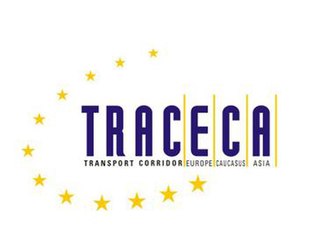
Foreign relations of Kazakhstan are primarily based on economic and political security consideration. The Nazarbayev administration has tried to balance relations with Russia and the United States by sending petroleum and natural gas to its northern neighbor at artificially low prices while assisting the U.S. in the War on Terror. Kazakhstan is a member of the United Nations, Collective Security Treaty Organization, Organization for Security and Co-operation in Europe, North Atlantic Cooperation Council, Commonwealth of Independent States, the Shanghai Cooperation Organisation, and NATO's Partnership for Peace program. Kazakhstan established a customs union with Russia and Belarus which eventually became the Eurasian Economic Union. President Nazarbayev has prioritized economic diplomacy into Kazakhstan's foreign policy.

Turkmenistan's declaration of "permanent neutrality" was formally recognized by the United Nations in 1995. Former President Niyazov stated that the neutrality would prevent Turkmenistan from participating in multi-national defense organizations, but allows military assistance. Its neutral foreign policy has an important place in the country's constitution. Although the Government of Turkmenistan claims to favour trade with and export to the United States, and Turkey, its single largest commercial partner is China, which buys the vast bulk of Turkmen natural gas via the Central Asia–China gas pipeline. Turkmenistan has significant commercial relationships with Russia and Iran and growing cross-border trade with Afghanistan. The Government of Turkmenistan often appears to use the conflicting interests of these regional powers as a means to extract concessions, especially on energy issues.

Transport in Europe provides for the movement needs of over 700 million people and associated freight.

The GUAM Organization for Democracy and Economic Development is a regional organization of four post-Soviet states: Georgia, Ukraine, Azerbaijan, and Moldova.

The European Structural and Investment Funds are financial tools governed by a common rulebook, set up to implement the regional policy of the European Union, as well as the structural policy pillars of the Common Agricultural Policy and the Common Fisheries Policy. They aim to reduce regional disparities in income, wealth and opportunities. Europe's poorer regions receive most of the support, but all European regions are eligible for funding under the policy's various funds and programmes. The current framework is set for a period of seven years, from 2021 to 2027.

The Energy Community, commonly referred to as the Energy Community for South East Europe (ECSEE), is an international organization consisting of the European Union (EU) and a number of non-EU countries. It aims to extend the EU internal energy market to wider Southeast Europe. The members commit to implement relevant EU energy acquis communautaire, to develop an adequate regulatory framework and to liberalize their energy markets in line with the acquis under the founding Treaty.

The Southeast European Cooperative Initiative (SECI) is a multilateral regional initiative that has been initiated by the European Union, the United States of America and the countries of Southeast Europe within the framework of the Organization for Security and Cooperation in Europe (OSCE) as a support to the implementation of the Dayton Accords in December 1996 at the inaugural session at Geneva on the basis of Final Points of Common EU-USA Understanding.

The Trans-Caspian Gas Pipeline is a proposed subsea pipeline between Türkmenbaşy in Turkmenistan, and Baku in Azerbaijan. According to some proposals it would also include a connection between the Tengiz Field in Kazakhstan, the Sangachal Terminal in Baku, and Türkmenbaşy. The Trans-Caspian Gas Pipeline project would transport natural gas from Turkmenistan and Kazakhstan to European Union member countries, circumventing both Russia and Iran. It would do this by feeding the Southern Gas Corridor. This project attracts significant interest since it would connect vast Turkmen gas resources to major consumers Turkey and Europe.

The energy policy of the European Union focuses on energy security, sustainability, and integrating the energy markets of member states. An increasingly important part of it is climate policy. A key energy policy adopted in 2009 is the 20/20/20 objectives, binding for all EU Member States. The target involved increasing the share of renewable energy in its final energy use to 20%, reduce greenhouse gases by 20% and increase energy efficiency by 20%. After this target was met, new targets for 2030 were set at a 55% reduction of greenhouse gas emissions by 2030 as part of the European Green Deal. After the Russian invasion of Ukraine, the EU's energy policy turned more towards energy security in their REPowerEU policy package, which boosts both renewable deployment and fossil fuel infrastructure for alternative suppliers.

Zviad Kvatchantiradze is a Georgian parliamentarian and diplomat. Chairman of the EU-Georgia Parliamentary Committee on Association. First Vice Chairman of the Committee on Foreign Relations of the Parliament of Georgia. Leader of Majority. Member of the Parliamentary Assembly of the Council of Europe (PACE). He was formerly Consul General of Georgia in Istanbul, Turkey, from 2005-2009 and Secretary-General of the TRACECA Intergovernmental Commission from 2000 to 2004. Holds a rank of Ambassador Extraordinary and Plenipotentiary since 2001.

TRACECA is an international transport programme involving the European Union and 12 member states of the Eastern European, Caucasus, and Central Asian region. The programme aim is to strengthen economic relations, trade, and transport in the regions of the Black Sea basin, South Caucasus, and Central Asia. It has a permanent Secretariat, originally financed by the European Commission, in Baku, Azerbaijan, and a regional office in Odesa, Ukraine. Since 2009, the organization has been entirely financed by member countries.

The Republic of Azerbaijan and the European Union (EU) have maintained a positive relationship through the years and have become more closely linked since 1991. Azerbaijan is currently part of the European Neighborhood Policy, the Eastern Partnership and the Council of Europe. The EU is the largest foreign grant donor to and investor in Azerbaijan, both in the government sector and civil society, making available over 600 million EURO of bilateral EU assistance since 1992.

The Caspian Sea is the world's largest inland body of water, often described as the world's largest lake and sometimes referred to as a full-fledged sea. An endorheic basin, it lies between Europe and Asia: east of the Caucasus, west of the broad steppe of Central Asia, south of the fertile plains of Southern Russia in Eastern Europe, and north of the mountainous Iranian Plateau. It covers a surface area of 371,000 km2 (143,000 sq mi), an area approximately equal to that of Japan, with a volume of 78,200 km3 (19,000 cu mi). It has a salinity of approximately 1.2%, about a third of the salinity of average seawater. It is bounded by Kazakhstan to the northeast, Russia to the northwest, Azerbaijan to the southwest, Iran to the south, and Turkmenistan to the southeast.

Foreign relations exist between Azerbaijan and Kazakhstan. Azerbaijan has an embassy in Astana and a consulate in Aktau. Kazakhstan has an embassy in Baku.

Interstate Oil and Gas Transportation to Europe (INOGATE) was an international energy co-operation programme between the European Union (EU), the littoral states of the Black and Caspian seas and their neighbouring countries. The programme was operational from 1996 to 2016.

The Union for the Mediterranean is an intergovernmental organization of 43 member states from Europe and the Mediterranean Basin: the 27 EU member states and 16 Mediterranean partner countries from North Africa, Western Asia and Southern Europe. It was founded on 13 July 2008 at the Paris Summit for the Mediterranean, with an aim of reinforcing the Euro-Mediterranean Partnership (Euromed) that was set up in 1995 as the Barcelona Process. Its general secretariat is located in Barcelona, Catalonia, Spain.

The Ministry of Energy of Azerbaijan Republic is a governmental agency within the Cabinet of Azerbaijan in charge of regulating the activities in the industry of production and energy sector of Azerbaijan Republic. The ministry is headed by Parviz Shahbazov.

Mikheil Janelidze is a chairman of Center for European Governance & Economy. He is a former Georgian government official who served as Vice Prime Minister (2017–2018), Minister of Foreign Affairs (2015–2018), First Deputy Minister of Foreign Affairs (2015) and Deputy Minister of Economy and Sustainable Development of Georgia (2011-2015).

Finland–Kazakhstan relations refers to the bilateral relations between Finland and Kazakhstan. Finland has an embassy in Nur-Sultan whilst Kazakhstan has an embassy in Helsinki. Both countries are members of Organization for Security and Co-operation in Europe.

Relations between Turkic Council and Azerbaijan started from the year of 2009 until present. Taking into account of the establishment date of the organization, Azerbaijan continues relations as a member of the founding country.
 Armenia
Armenia Azerbaijan
Azerbaijan Belarus
Belarus Bulgaria
Bulgaria Georgia
Georgia Kazakhstan
Kazakhstan Kyrgyzstan
Kyrgyzstan Moldova
Moldova Romania
Romania Russian Federation (observer status only)
Russian Federation (observer status only) Tajikistan
Tajikistan Turkey
Turkey Turkmenistan
Turkmenistan Ukraine
Ukraine Uzbekistan
Uzbekistan

















